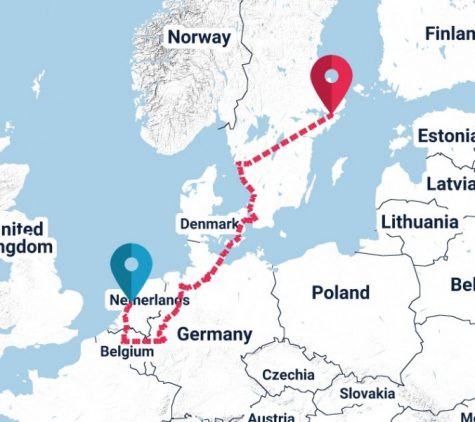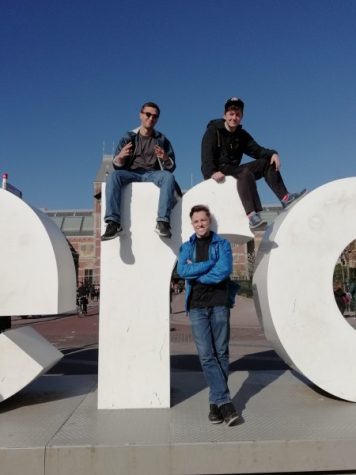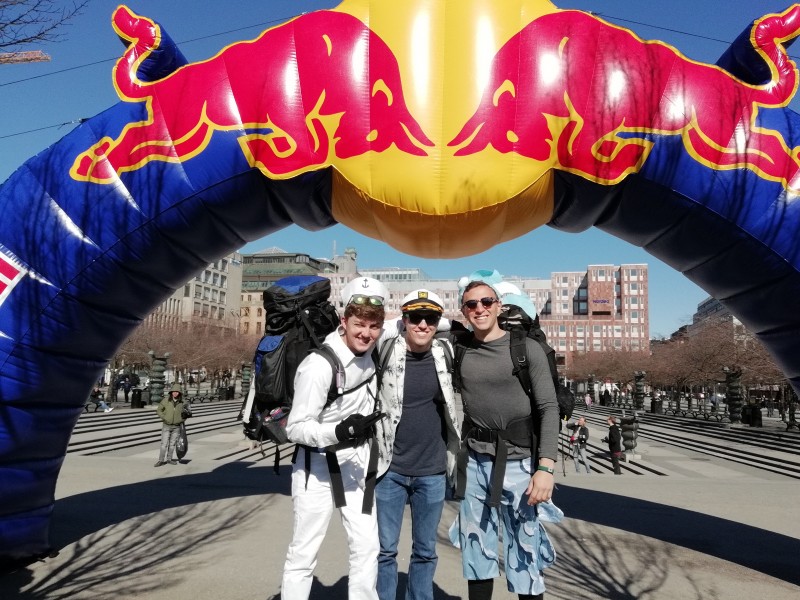Tulane seniors wing it in Europe during Red Bull race
Photos Courtesy of the Bayou Krewe
Three Tulane seniors traveled through Europe with only their wits and a few cans of Red Bull as a part of Red Bull’s “Can You Make It?” campaign.
1351 kilometers. Seven days. Nothing but Red Bull. Could you make it? A few days ago, a team of three Tulane seniors did.
The Red Bull Can You Make It? challenge is an annual race with 200 teams from 57 countries to make it from different starting points in Europe to Amsterdam with only Red Bull cans as currency. The Tulane team made it from Stolkholm to the finishing point in 85th place.
Without money or a way to contact anybody, the teams have to rely on trading cans of Red Bull to get transportation, food and shelter. If that weren’t hard enough, the teams also all have to pass certain checkpoints throughout Europe within a certain time frame in order to make it to Amsterdam in seven days.
Understanding the risks involved in participating in the challenge, Red Bull created a highly selective application process for choosing participants.
Three months after senior Nick Feichtel brought the idea to his friends, and three weeks before the February deadline, the team, which was made up of Feichtel and Seniors Ethan Gasta and Jeffrey Nagler, decided to give the application a shot.
After coining themselves “The Bayou Krewe,” the team spent over 30 hours creating a one-minute video that would be their application. After earning over 800 votes through social media, the video, along with seven others from the region, made it to the Red Bull judges round. The Bayou Krewe video was one of two selected based on creativity, charm and adventure factor from the eight to participate in the challenge.
Teams are given nothing but a case of 24 Red Bulls, as well as a backpack with water, granola bars, clothes, toiletries, a tripod, a selfie-stick and a phone. The phone only functions to allow the team to look at a checkpoint map, contact other teams and upload vlogs to the Red Bull website – certainly no Uber or Venmo to cheat the rules.

Teams had to travel from Stockholm to Amsterdam in seven days.
By passing through checkpoints located across Europe, teams could earn more Red Bulls to barter for food, shelter and transportation to the next city within the time frame. With only these cans as a currency, it was not an easy task.
“The things that you don’t see through our vlogs and pictures, that you don’t see on the Red Bull app and our social media is the hours and hours, I don’t want to say begging, but of going up to random strangers and asking and asking and getting rejected over and over again,” Gasta said. “We would do that for hours.”
The team, however, managed to make it to every city, either by hard work, luck or the generosity of strangers.
“Somehow, all of these teams would find transportation, find food,” Nagler said. “It was unbelievable. Sometimes it came close where we didn’t think we would find transportation, and then we somehow found transportation.”
According to Gasta and Nagler, the hardest part of the competition was the constant stress and constantly being pushed out of their comfort zone.
“I am very used to a hard workload,” Gasta said. “I work my ass off in college. … I just got unbelievably stressed because you wake up in the morning, and you are ready to go because you think about it like, I have no idea how I am getting to the next city because I have a deadline to make, I have no idea where I am going to sleep, where I am going to eat, all these things. I need to go get insanely lucky or work my ass off for it.”

The Bayou Krewe successfully made it to Amsterdam.
Despite the difficulties of the race, the team said it recommends the race to other Tulane students seeking a life-changing experience. According to the team, the most impactful aspect of the competition was the generosity of the strangers they met throughout.
“I was touched by the generosity that I saw,” Nagler said. “We were basically homeless for a week. We just needed people to help us. In our time of need, they came through, so many times, and they just wanted nothing in return, and it was just so amazing to see … It really inspired me to be as generous as possible to every person I meet.”
Your donation will support the student journalists of Tulane University. Your contribution will allow us to purchase equipment and cover our annual website hosting costs.

















Leave a Comment